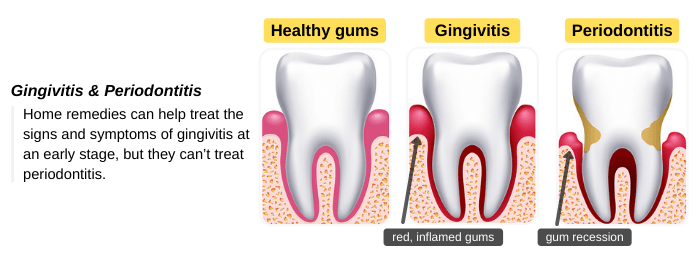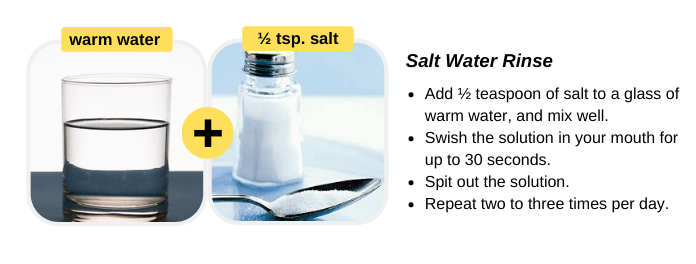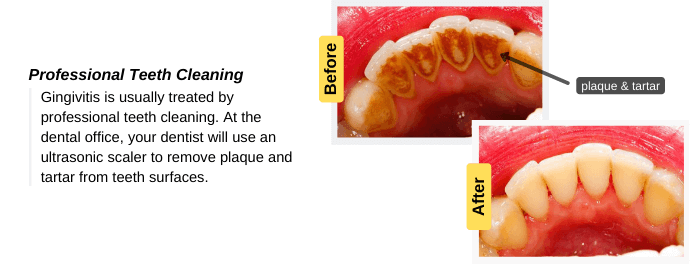Gingivitis is a mild form of gum disease. It usually occurs due to the accumulation of plaque above and below the gum line. Dental plaque is a sticky, colorless film of bacteria that can be easily removed by brushing and flossing. If plaque is not removed regularly, it can harden into tartar, which can’t be removed by brushing or flossing. Both plaque and tartar irritate gums and cause infection in the gums. Gingivitis is a reversible condition. However, untreated gingivitis can progress into periodontitis, which can cause permanent damage. Home remedies are an effective way for gingivitis treatment because they can help remove plaque before it becomes tartar. However, home remedies can’t treat periodontitis.
Gingivitis may occur due to other causes, for example, hormonal changes during pregnancy (pregnancy gingivitis) or breastfeeding, vitamin-C deficiency, dry mouth condition, broken tooth filling, poorly fitted bridge or denture, and side effects of some medications. In these cases, home remedies may not be effective for the treatment of gingivitis because you need to treat the underlying cause. So, you need to visit your dentist for diagnosis and treatment. In this article, we will discuss the treatment of gingivitis at home (home remedies) and at a dental office.
How Do You Know You Have Gingivitis?
Home remedies can help treat gingivitis at an early stage, but they can’t treat periodontitis. Periodontitis is a serious gum infection that destroys tooth-supporting tissues such as bone and periodontal ligaments. In this case, you need to visit your dentist immediately for the treatment of gingivitis and periodontitis. Recognizing the signs and symptoms of gingivitis and periodontitis can help you treat them early and avoid complications.
Gingivitis Signs & Symptoms (Home remedies can Treat These)
- Red, swollen gums.
- Gum bleeding.
- Bad breath.
- Gums tender to touch.
Periodontitis Signs & Symptoms (Home remedies can’t Treat These)
- Gum recession: your teeth may appear longer than normal.
- Periodontal pockets: periodontitis can lead to the formation of spaces around your teeth.
- Painful chewing.
- Gum abscess.
- A change in your bite (misaligned teeth).
- Loose teeth or loss of teeth.

4 Home remedies for Gingivitis Treatment
These home remedies will help you treat the signs and symptoms of gingivitis at an early stage. The home remedies include:
- Saltwater rinse: this one of the common gingivitis home remedies. Salt is a natural disinfectant. Put ½ teaspoon of salt in a cup of warm water, and mix them well. Don’t use salt water rinse too often or too long because it may erode the tooth enamel. Several studies showed that using salt water can relieve inflammation, help ease pain, and reduce bacteria.
- Brush your teeth regularly: many people stop brushing their teeth when they notice gum bleeding. This makes gingivitis worsen. Tooth brushing removes plaque and can help reduce gum inflammation and bleeding.
- Floss your teeth: it is important for the treatment of gingivitis. Use dental floss to remove plaque and food debris from between teeth. The toothbrush can’t reach and clean the areas between teeth.
- Use antibacterial toothpaste and mouthwash: they can help fight bacteria. Don’t use the mouthwash immediately after brushing your teeth because it will wash away the fluoride toothpaste left on your teeth.

These home remedies will treat the signs and symptoms of gingivitis but won’t eliminate the need to visit a dentist. You need to visit your dentist for professional teeth cleaning because home remedies can’t remove tartar from above and below the gum line. If gingivitis is not treated properly, the infection may spread to the tooth-supporting tissues, causing periodontitis.
Can Home Remedies Treat Gingivitis?
Yes, home remedies can treat the signs and symptoms of gingivitis at an early stage. However, they have limitations. Home remedies can’t remove tartar from above and below the gumline because tartar is rough and can’t be removed by toothbrushing. So, you will need to visit a dentist for professional teeth cleaning. Also, home remedies won’t treat the underlying cause of gingivitis such as vitamin-C deficiency, dry mouth condition, broken tooth filling, poorly fitting dentures, and misaligned teeth. So, gingivitis may occur again quickly after using home remedies.
If gingivitis is not treated properly, the infection may spread to the tooth-supporting tissues, causing periodontitis and complications. Home remedies can’t treat periodontitis. If you noticed the signs and symptoms of gingivitis, you should visit your dentist as soon as possible for diagnosis and treatment. Your dentist can identify the underlying cause, treat it properly, and stop the progress of periodontitis.
Treatment of Gingivitis at the Dental Office
If you noticed the signs and symptoms of gingivitis, you should visit your dentist as soon as possible for diagnosis and treatment. Your dentist will examine your mouth to determine the underlying cause. Causes of gum infection include:
- Poor oral hygiene.
- Broken tooth filling.
- Poorly fitted crowns, bridges, or dentures.
- Misaligned teeth.
- Vitamin-C deficiency.
- Dry mouth condition.
- Side effects of some medications such as drugs used for angina or high blood pressure.
- Some medical conditions.
At the dental office, your dentist may use an ultrasonic scaler to remove plaque and tartar from above and below the gum line (professional teeth cleaning). Also, they will treat the underlying cause, for example, replace the broken filling, replace the poorly fitted bridge or denture, and orthodontic treatment. Your dentist will refer you to a physician if gingivitis occurs as a side effect of a medication or is associated with a medical condition.

How to Prevent the Recurrence of Gingivitis?
You should practice good oral hygiene to prevent the recurrence of gingivitis and the spread of infection.
- Brush your teeth and tongue with a small-head, soft-bristled toothbrush at least twice per day.
- Replace your toothbrush every 3-4 months.
- Use fluoride toothpaste to help fight bacteria.
- Use dental floss to remove food particles and plaque from between teeth.
- Drink enough water daily to prevent dehydration and dry mouth condition. Also, avoid smoking.
- Limit sugary foods.
- Schedule an appointment with your dentist every 6 months for professional teeth cleaning.